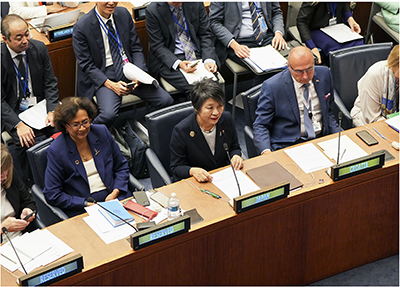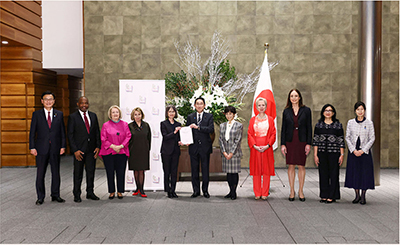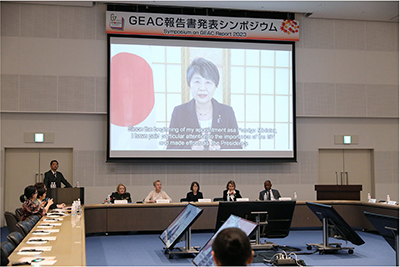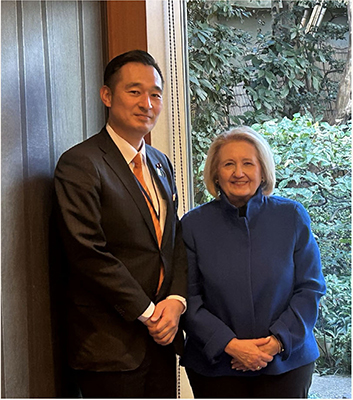Diplomatic Bluebook 2024
Chapter 3
Diplomacy to Defend National Interests through Co-creation with the World
8 Gender Equality and Women's Empowerment
Russia's aggression against Ukraine, which has been ongoing since 2022, as well as the armed conflict in the Gaza Strip, triggered by terror attacks by Palestinian militant groups such as Hamas and others in October 2023, have seriously affected particularly women and girls, as represented by the increase in the number of reports on conflict-related sexual violence (CRSV). Furthermore, large-scale natural disasters such as typhoons, hurricanes, floods, earthquakes, and large fires, caused by climate change, are occurring frequently around the world regardless of the country, and there are growing anxieties about healthcare, food, and energy. These problems further highlight existing gender inequalities. For this reason, it is necessary to prioritize the realization of gender equality and the promotion of women's empowerment as one of the most important issues for peace and prosperity in Japan and the world. It is vital to focus on various policies and measures for women and girls in order to realize a more peaceful and prosperous society. Gender mainstreaming, which is to incorporate the gender perspective into all policies is becoming increasingly important in the international community. In particular, it is important to maintain the perspective of “Women, Peace and Security” (WPS), the foundational concept that the international community has a better chance to achieve sustainable peace by the equal and full participation of women in all stages of decision-making leading up to post-conflict peacebuilding.
The Basic Policy on Economic and Fiscal Management and Reform 2023, which serves as the basis for Japan's budget, covered WPS for the first time. The Ministry of Foreign Affairs (MOFA) established a task force under the Minister for Foreign Affairs in January 2024 to promote WPS across MOFA by using every available tool, including ODA. Japan will continue to contribute to the realization of gender equality including WPS, and the promotion of women's empowerment by hosting international conferences on women, vigorously supporting developing countries through development assistance as well as international cooperation with other countries and international organizations.
(1) G7
The G7 Leaders' Communiqué, which was issued at the G7 Hiroshima Summit held in May addressed gender as a major theme across three paragraphs, and also touched on gender in the preamble and within the broad context of development, food security, labor, education, digital, human rights, countering terrorism, and regional affairs. Among these, it is especially noteworthy that the document includes the leaders' commitment to the achievement of a society where all people can enjoy vibrant lives free from violence and discrimination, independent of gender identity or expression or sexual orientation, as well as their advocacy for creating a “nexus”53 that bridges the political and security, economic and social spheres for maximizing the efficiency and the impact of actions, so as to deepen gender mainstreaming. The G7 Ministerial Meeting on Gender Equality and Women's Empowerment in Nikko, Tochigi, held in Japan for the first time in June, was chaired by OGURA Masanobu, Minister in charge of Women's Empowerment and Minister of State for Gender Equality. The outcomes of the meeting were compiled in the Joint Statement of the G7 Gender Equality Ministers (Nikko Statement). At the G7 Foreign Ministers' Meeting held in Tokyo in November and chaired by Foreign Minister Kamikawa, the commitment to further build international solidarity beyond the G7 to address broader global challenges such as gender equality including the WPS agenda, was incorporated into the Foreign Ministers' Statement.
Mechanisms to monitor the G7's commitments in the area of gender were also implemented steadily, including the revision of the G7 Dashboard on Gender Gaps,54 and the publication of the first G7 Gender Equality Implementation Report by the Organisation for Economic Cooperation and Development (OECD), among others.
- 53 NEXUS: Means “consistency,” “connectivity,” and “continuity.”
- 54 With an aim to continuously monitor G7 commitments, in June 2022, the G7 Elmau Summit endorsed the G7 Dashboard on Gender Gaps, which selects 12 indicators from the areas of education, employment and social security, entrepreneurship, leadership, health and well-being, and funds for development cooperation, and maps the progress of gender equality in the G7 countries and EU.
(2) G20
In August, the third G20 Ministerial Conference on Women's Empowerment was convened in Gandhinagar (India) under India's G20 Presidency. The main theme of this meeting was “Women-led Inclusive Development as Cusp of Inter-Generational Transformation.” Minister in charge of Women's Empowerment and Minister of State for Gender Equality Ogura participated in the session entitled “Skilling Opportunities for Women,” where he spoke about the current status of gender equality in Japan and the relevant initiatives, the Nikko Statement compiled at the G7 Ministerial Meeting on Gender Equality and Women's Empowerment in Nikko, Tochigi, and other related topics. The Leaders' Declaration issued at the G20 New Delhi Summit in September affirmed the importance of gender equality and the empowerment of all women and girls, strengthening economic and social empowerment, and closing the digital divide between genders.
(3) International Cooperation for the Empowerment of Women in Developing Countries
Through Japan International Cooperation Agency (JICA) and international organizations, Japan is engaged in educational support and human resource development, as well as efforts toward the economic empowerment of women and the elimination of gender-based violence in developing countries.
A Educational Support and Human Resource Development
At the Global Education Summit held in July 2021, Foreign Minister Motegi announced in his video message that Japan will provide education support of more than 1.5 billion U.S. dollars over a five-year period, and support the provision of opportunities for quality education and human resource development to at least 7.5 million girls in developing countries. These efforts are now ongoing. At the 77th UN General Assembly convened in September 2022, Prime Minister Kishida declared that Japan will focus on human resource development and capacity building while putting the emphasis on “investment in people.” He also assumed the position of “Education Champion”55 and stated that he will promote cooperation through human resource development based on the outcome of the UN Transforming Education Summit.
- 55 At the same UN General Assembly, Prime Minister Kishida, at the request of UN Secretary-General António Guterres, assumed the position of the first “Education Champion,” fulfilling the role as a leader who promotes education in the international community.
B Supporting Women Through JICA
To promote the economic empowerment of women, Japan has provided support to improve the livelihoods of low-income female home-based workers in Pakistan, and promoted the provision of financial services that meet the needs of women in Viet Nam. To promote peace and security for women, it also provides support to strengthen coordination as well as the capacity of organizations involved in addressing trafficking in persons in the Mekong region. Furthermore, in South Sudan and Pakistan, Japan has provided cooperation aimed at protecting the survivors of gender-based violence and supporting them to gain independence. Japan also conducted training with participants from 12 countries, on the theme of eradicating sexual and gender-based violence.
C Approach to Sexual Violence in Conflict
Sexual violence as tactics of war is a problem that cannot be overlooked. It is vital to put an end to impunity and to support victims. Japan has been actively working in this field to eliminate human rights violations against women in the 21st century. Japan prioritizes cooperation with international organizations such as the Office of the Special Representative of the Secretary-General on Sexual Violence in Conflict (OSRSG-SVC), and participation in discussions at international fora. In 2023, Japan provided financial support of approximately 0.9 million U.S. dollars to the OSRSG-SVC, providing medical and psychological support as well as support for socio-economic integration to victims of gender-based violence, including conflict-related sexual violence, in Mali. In 2023, Japan contributed an additional 2 million Euros to the Global Survivors Fund (GSF), founded by 2018 Nobel Peace Prize laureates Dr. Denis Mukwege and Ms. Nadia Murad, bringing Japan's total contributions to 8 million Euros by 2023 (as of December 31, 2023). As a member of the board, Japan is also actively involved in the management of this Fund. Furthermore, Japan continues to make voluntary contributions to the Trust Fund for Victims of the International Criminal Court (ICC), earmarking contributions for victims of sexual violence and putting efforts into protecting victims of such violence. In addition, Japan also provides support through UN Women.
(4) Initiatives in the UN
A Women, Peace and Security (WPS)
Japan is strongly promoting WPS as one of its major diplomatic policies. WPS is an idea that the international community has a better chance to achieve sustainable peace by the equal and full participation of women in all stages of decision-making from the protection of women and girls in conflict, conflict prevention to peace processes and post-conflict peacebuilding. It was first stipulated in the UN Security Council resolution 1325 adopted in 2000.
Since assuming her position, Foreign Minister Kamikawa has taken various opportunities to communicate the importance of WPS, at both bilateral and multilateral meetings, including visits to New York during the UN High-Level Week, visits to Southeast Asia and the Middle East, as well as the G7 Foreign Ministers' Meetings. During the UN General Assembly High-Level Week in September, Foreign Minister Kamikawa attended the Women, Peace and Security (WPS) Focal Point Network High-Level Side Event and the Women, Peace, and Leadership Symposium co-hosted by the International Peace Institute (IPI), the Government of Ireland, and the Sasakawa Peace Foundation, and stated that Japan will make further efforts to promote WPS as a non-permanent member of the UN Security Council. During her visit to San Francisco in November for the APEC Ministerial Meeting, she delivered a keynote speech at the WPS+I (Women, Peace, and Security + Innovation) symposium, on the theme of innovation to elevate WPS to the next level. In her speech, Foreign Minister Kamikawa pointed out that men's engagement is essential for the promotion of WPS and the empowerment of women, and that it is critical to incorporate the WPS agenda in the areas of disaster response, prevention and mitigation with natural disasters occurring frequently around the world. She also pointed out that in the current era when peace and stability are wavering, we should discuss the economy, peace, and stability as inseparable issues, and engaged in innovative and creative discussions.
 Foreign Minister Kamikawa attending the WPS Focal Points Network High-Level Side Event (September 21, New York, U.S.)
Foreign Minister Kamikawa attending the WPS Focal Points Network High-Level Side Event (September 21, New York, U.S.)From the perspective that it is important to learn from the experts in various fields and on the ground in order for Japan to take WPS to the next level, Foreign Minister Kamikawa organized a dialogue session as the second “WPS + I” event, entitled “WPS + Innovation - from the field of humanitarian aid especially for refugees and internally displaced persons (IDPs).” The session was moderated by Ms. SATO Mariko, Senior Regional Advisor for Asia and the Pacific, International Organization for Migration (IOM). Foreign Minister Kamikawa heard from representatives from United Nations High Commissioner for Refugees (UNHCR), the International Committee of the Red Cross (ICRC), the International Federation of Red Cross and Red Crescent Societies (IFRC), and IOM, about the challenges they face and the role they expect from Japan, based on their experiences in the field of refugee and humanitarian assistance. Furthermore, Foreign Minister Kamikawa participated in an event organized by the Sasakawa Peace Foundation entitled “Female Foreign Ministers of Japan and Indonesia Talk ~Why do we need women's perspectives?” She emphasized the importance of women's perspectives in disaster response, and expressed that she would like to promote the WPS agenda together with Indonesia and other ASEAN countries on the occasion of the 50th year of Japan-ASEAN Friendship and Cooperation, and to spread the mainstreaming of WPS to the entire international community together with Foreign Minister Retno Marsudi.
In addition, Foreign Minister Kamikawa delivered video messages to the Symposium on “Engaging Men as Allies in Women, Peace and Security” hosted by the Georgetown Institute for Women, Peace and Security and the Sasakawa Peace Foundation in October, and the Reykjavík Global Forum 2023 hosted by Women Political Leaders (WPL), the Government of Iceland and the Parliament of Iceland in November. In her messages, she expressed her desire to further promote the WPS agenda.
In April, Japan formulated the Third Edition of the National Action Plan on Women, Peace and Security (2023-2028) (an action plan toward implementation of UN Security Council resolution 1325 on women, peace and security, and the related resolutions). In line with this Action Plan, in addition to contributing to WPS in the Middle East, Africa, and Asia mainly through contributions to international organizations such as UN Women and OSRSG-SVC, Japan has also prepared a report on the implementation status of monitoring and an evaluation report by an evaluation committee comprising external experts. The WPS Panel Discussion “How Japan can contribute to promoting women's participation in international peace and security” was held in Japan in December as a follow-up event of the G7 Gender Equality Advisory Council (GEAC) and World Assembly for Women (WAW!), and working-level and high-level discussions were held during this event (See the Special Feature on page 268).
Women's empowerment has been included as an agenda item in the G7 Summit since 2015, and it is recognized as an important issue. The G7 Leaders' Communiqué, which was issued at the G7 Hiroshima Summit held in May, with Japan serving as the Presidency, addressed gender as a major theme across three paragraphs, and also touched on gender in the preamble and within the broad context of development, food security, labor, education, digital, human rights, countering terrorism, and regional affairs. In December, the Gender Equality Advisory Council (GEAC), an external advisory body to provide recommendations on gender equality to the G7 leaders, submitted its final report containing its recommendations to Prime Minister Kishida. Furthermore, since 2014, the Government of Japan has been holding World Assembly for Women: WAW! as a part of its efforts to realize gender equality and women's empowerment in Japan and overseas. From the viewpoint of following up on these efforts, the Ministry of Foreign Affairs (MOFA) held events on gender equality and women's empowerment in December.
●Courtesy Call to Prime Minister Kishida by GEAC
 Courtesy call to Prime Minister Kishida by GEAC (December 12, Tokyo. Photo: Cabinet Public Affairs Office)
Courtesy call to Prime Minister Kishida by GEAC (December 12, Tokyo. Photo: Cabinet Public Affairs Office)On December 12, Prime Minister Kishida received a courtesy call from representatives of GEAC, chaired by Dr. SHIRAHASE Sawako, Professor of the University of Tokyo. The eight GEAC members submitted their final report, “Gender Mainstreaming for an Inclusive, Peaceful, and Just Society,” and expressed their strong expectation that Japan and other G7 members will further promote gender equality and women's empowerment through gender mainstreaming. In response, Prime Minister Kishida expressed his wish to continue to further advance gender mainstreaming.
●G7 Hiroshima Summit Follow-up event: Symposium on GEAC Report 2023 - Toward Gender Equality and Women's Empowerment
 Video message from Foreign Minister Kamikawa in the Symposium on GEAC Report 2023 (December 13, Tokyo)
Video message from Foreign Minister Kamikawa in the Symposium on GEAC Report 2023 (December 13, Tokyo)The “G7 Hiroshima Summit Follow-up event: Symposium on GEAC Report 2023 - Toward Gender Equality and Women's Empowerment” was held on December 13. GEAC members discussed the contents of the recently published final report from the perspectives of experts in various fields with knowledge of gender issues. In her video message, Foreign Minister Kamikawa stated that the recommendations in the final report are consistent with the stance of the G7, and welcomed that ensuring the full implementation of Women, Peace and Security (WPS) is included in the recommendations.
●Women, Peace and Security (WPS) Panel Discussion: “How Japan can contribute to promoting women's participation in international peace and security” - G7 GEAC and WAW! Follow-up event
 WPS Panel Discussion (December 13, Tokyo)
WPS Panel Discussion (December 13, Tokyo) Lunch meeting between Parliamentary Vice-Minister for Foreign Affairs Fukazawa and Executive Director Verveer of the Georgetown Institute for WPS (December 14, Tokyo)
Lunch meeting between Parliamentary Vice-Minister for Foreign Affairs Fukazawa and Executive Director Verveer of the Georgetown Institute for WPS (December 14, Tokyo)On the same day, a panel discussion on WPS was held on the theme “How Japan can contribute to promoting women's participation in international peace and security.” The first part began with an introduction by MOFA of the features of Japan's WPS Action Plan and WPS initiatives unique to Japan, followed by reports based on experiences related to WPS on the frontlines from the Ministry of Defense, Sasakawa Peace Foundation, Japan International Cooperation Agency (JICA), and NGO representatives, among others. In the second part, speakers including Melanne Verveer, Executive Director of the Georgetown Institute for Women, Peace and Security; MEGURO Yoriko, Professor Emeritus of Sophia University; Maxime Houinato, Regional Director for UN Women East and Southern Africa Regional Office; and Peter Roberts OAM, Minister and Deputy Head of Mission of the Australian Embassy in Japan, participated in a lively discussion on conflict and disaster response in light of the WPS agenda. In addition, Executive Director Verveer held an informal talk with Parliamentary Vice-Minister for Foreign Affairs FUKAZAWA Yoichi, during which they exchanged views on Japan's WPS initiatives and other topics.
B Cooperation with UN Women
Japan strengthened its cooperation with UN Women and increased its contribution from approximately 2 million U.S. dollars (2013) to 20.66 million U.S. dollars (2023). In particular, for women and girls in developing countries, Japan works on strengthening their capacity to participate in the peacebuilding and reconstruction processes, economic empowerment of women such as livelihood and entrepreneurship support, and support for women victims of gender-based violence. Japan also supports women's economic empowerment through providing daily necessities to women and girls who have been affected by conflict and natural disasters, and job creation and vocational training.
C United Nations Commission on the Status of Women (CSW)
The CSW held its 67th session (CSW67) in March, and it was held as the first in-person meeting since CSW63 in 2019. The session hosted discussions on the priority theme of “Innovation and technological change, and education in the digital age for achieving gender equality and the empowerment of all women and girls.” Minister in charge of Women's Empowerment and Minister of State for Gender Equality Ogura explained Japan's initiatives toward women's empowerment in the digital sector (via recording) at the General Discussions. In the Ministerial Round Table, TANAKA Yumiko (Visiting Professor, Josai International University) spoke on behalf of Japan, introducing Japan's efforts to support women's employment in the digital sector, and to support improvement in digital skills for women overseas as a part of its international cooperation initiatives.

